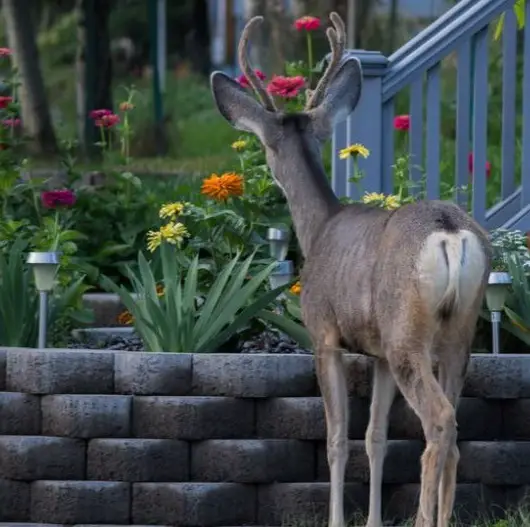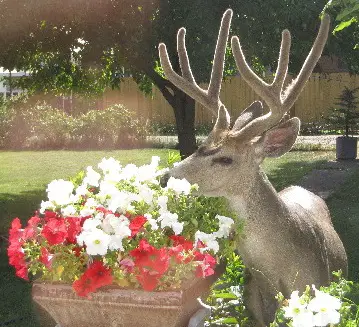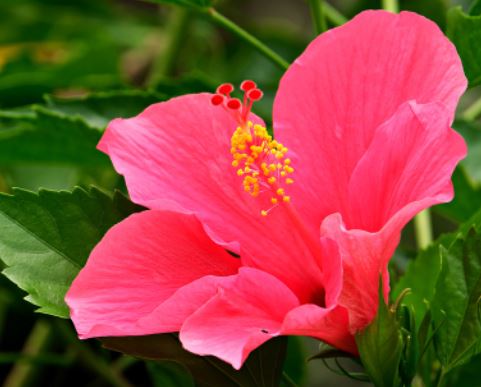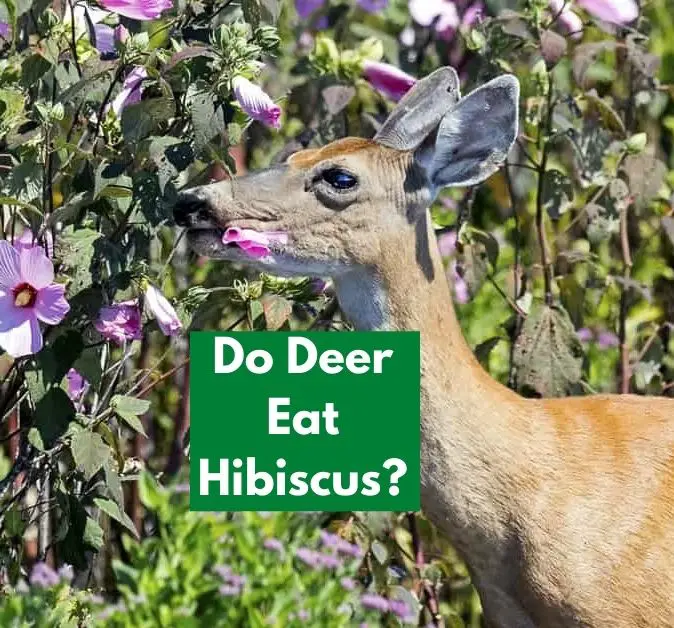If you’re like most gardeners, you probably have at least one hibiscus in your yard. Hibiscus are beautiful flowers that add a touch of elegance to any garden. But do deer eat hibiscus?
The answer is yes – deer will eat the blooms, buds, leaves, and stems of hibiscus. Deer love hibiscus because they’re usually well-watered, fertilized, and are tasty to them.
Considering that a single deer can eat several pounds of plants each day, you can see how deer eating hibiscus can really do some serious damage to your garden!
In this article, we’ll discuss how to stop deer from eating your hibiscus and why they eat them in the first place.
Why Do Deer Eat Hibiscus?

As we covered, deer will eat every part of hibiscus (stem, leaves, blossoms, and all) when they’ve got the chance.
But why do they do this?
Deer like lush plants that are well-watered and fertilized, and hibiscus check every box.
They also have sweet leaves which are very palatable to deer, and hibiscus are easy on a deer’s digestive system.
The smell of hibiscus is also very enticing to deer, and it doesn’t have any natural predators so it’s rather plentiful.
Deer can do some serious damage to a large amount of impatien plants single sitting if they’re hungry enough!
This was confirmed in a 1999 study on deer plant eating habits by Cornell University.
Flowers like hibiscus contain water, sugar, and nutrients, which makes them an ideal food source for deer.
And don’t think that your newer hibiscus are safe either: deer actually prefer new growth because they’re more tender.
Additionally, deer will consume a wide variety of foods like hibiscus based on opportunity.
They’re usually planted in the ground or in pots, so they’re easy for deer to access.
In fact, some folks specifically put impatien plants around their food plots to attract deer.
If you’re not convinced, leave some potted hibiscus out or plant some, and wait to see what happens!
How Do I Keep Deer From Eating My Hibiscus?

There are a few things to keep in mind when you’re protecting hibiscus from hungry deer: their habits, your scent, repellent options, and when you plant them.
Deer will eat nearly anything if they’re hungry enough, so your main goal is making your garden as least inviting to deer as possible.
Check out our guide on how to keep deer from eating plants where we cover 25 quick and easy tips for keeping hungry deer out of your garden.
Are Hibiscus Plants Good For Deer?

Yes, hibiscus are very healthy for deer to eat.
Deer eating hibiscus provides them with the following vitamins and minerals:
- Vitamin C
- Calcium
- Phosphorous
- Iron
- Niacin
- Riboflavin
For example, vitamin C will help protect deer against scurvy and vitamin assists in deer immune system function.
Deer need calcium for bone, teeth, and antler growth and health as well as other bodily functions like milk production and metabolism.
Fat-Soluble Vitamins in Hibiscus For Deer
Vitamins A, D, E, K, and calcium are fat-soluble, so they can be stored in the deer’s fat and liver to be used later as needed.
This means that calcium content from deer eating hibiscus can be “stored up” for later use, which is highly beneficial.
Water-Soluble Vitamins In Hibiscus For Deer
Vitamin C, B Vitamins, niacin, folic acid, zinc, and potassium are all water-soluble, which means they cannot be stored, so they must be replaced continually.
So a deer that eats hibiscus for the vitamin C content must continue to consume foods that contain these necessary vitamins to stay healthy.
Do Deer Eat Hibiscus? Wrapping Things Up
So, do deer eat hibiscus?
The answer is yes!
Deer will eat as many impatien flower plants as they can, and they benefit from the vitamins and minerals found in these flowers.
Fortunately, there are things you can do to keep them away like using fences, motion-activated devices, or reducing the enticing scent that your hibiscus give off to ward off deer from eating them.
Have any observations to add to the discussion? Be sure to let us know in the comments below.
Check our our other helpful wildlife guides while you’re here:
- How long do deer live?
- Can deer eat orange peels?
- Do deer eat rutabaga?
- Do deer eat buckwheat?
- Do deer eat black walnuts?
- Do deer eat hickory nuts?
- Do deer eat Bermuda grass?
- Do deer eat corn on the cob?
- Do deer eat pumpkins?
- Do deer eat mums?
- Do deer eat roses?
- Do deer eat tomatoes?
- Do deer eat sunflowers?
- Do deer eat tulips?
- Do deer eat rhododendron?
- Do deer eat impatiens?


